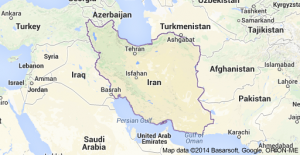Special to WorldTribune.com
The Islamic State of Iraq and the Levant’s (ISIL) extraordinary gains in much of Iraq have upset the geopolitical apple cart in the region.
It has called into question both the value of the West’s intervention in Iraq and the degree of influence Iran enjoys in the area. It also posits for the first time the possibility that the U.S. government and Iran’s revolutionary regime may work together to stabilize Iraq. It might also help cast light on the motivations of the various parties.
 Iran blames the ISIL’s advance in Iraq firmly on Saudi Arabia and claims that Riyadh is funding the jihadis even though western governments say there is no evidence of any government backing for the militias.
Iran blames the ISIL’s advance in Iraq firmly on Saudi Arabia and claims that Riyadh is funding the jihadis even though western governments say there is no evidence of any government backing for the militias.
Blaming Saudi Arabia for the violence in Iraq could indicate anxiety in Tehran over the rapid unfolding crisis.
The swift takeover of northern and eastern areas of Iraq by the ISIL militants appeared to have taken officials by surprise, leading to speculation that Iran’s intelligence service had underestimated the magnitude of the ISIL threat.
Any spillover of sectarian war or disintegration of Iraq into Kurdish, Shia and Sunni entities could have grave consequences for Iran, which is home to dissident ethnicities, including Kurds, and religious minorities.
On the one hand, both Iran and the USA have much to gain from cooperating on halting ISIL’s plan to set up a new Islamic state. They both fear ISIL and other related extremist Sunni groups, albeit for different reasons.
Furthermore, such cooperation could also ease cooperation on other issues, primarily Iran’s proposed nuclear program.
Initial signs have been encouraging. President Hassan Rouhani’s government has sent out positive signals concerning cooperation, citing the positive knock-on effects it would have for further nuclear negotiations and for Iran’s new found policy of moderation and engagement. Washington is also keen to put relations on a surer footing, so that the prickly issue of Iran’s nuclear program can be resolved peaceably.
Nevertheless, there are serious obstacles to improved relations. Within the Iranian government there are major opponents to cooperation with the USA. Supreme Leader Ayatollah Khamenei has already spoken out in public against plans to work with Washington.
That close U.S.-Iran cooperation is fraught with other complications. American and Iranian interests with respect to Iraq do not match easily.
The Islamic Republic of Iran is seeking primarily to prevent the ISIL from occupying Baghdad and destroying the Shia holy shrines of Najaf and Karbala. It is seeking to defend its own considerable geopolitical and religious interests. To advance those Shia interests it has increased Quds force activities in Iraq, mobilizing thousands of loyal Iraqi Shia militiamen to stop ISIL in its tracks.
Iraqis say senior Iranians have been coordinating activity on behalf of the Maliki government, liaising between Shia militias and the armed forces. It has been said that Iran has been directing surveillance drones over Iraq from an air field in Baghdad and secretly supplying Iraq with military equipment.
Thus, though both the U.S. government and the regime in Baghdad pay lip service to the idea that the solution lies in greater inclusion of the government in Bagdad, Iran is in fact pursuing policies dominated by sectarianism. While the ISIL forces are seeking to cleanse much of Iraq of the Shia population, Iran is determined to expell the Sunnis.
Dr. Assad Homayoun, who heads the Azadegan Foundation and a former Minister for Political Affairs at the Iranian embassy in Washington, elaborates: “To understand Iran’s geostrategic position in the region and for the U.S.A. we need to take a careful look at the map and location of Iran. Iran geographically is a large country of 1,648,195 square kilometers and possesses a unique gostrategic situation with a population of 75 million, with a long history, strong intellectual, cultural tradition, nationalism and bountiful natural resource, especially vast resources of oil and natural gas. It has 12 percent of the world’s proven reserves of petroleum and also the world’s second largest reserves of natural gas. Iran is also located in a critical area between two zones of energy, the Persian Gulf and the Caspian Sea, which contains 70 percent of world’s known energy reserves and 60 percent of its natural gas. Therefore any solution in the Middle East, Syria and Iraq requires some sort of Iranian involvement, whether Washington,Riyadh or Tel Aviv want it or not.”
Dr. Fariborz Saremi is a strategic analyst based in Hamburg/Germany and a contributor for Freepressers.com, World Tribune.com and Defense & Foreign Affairs.

You must be logged in to post a comment Login